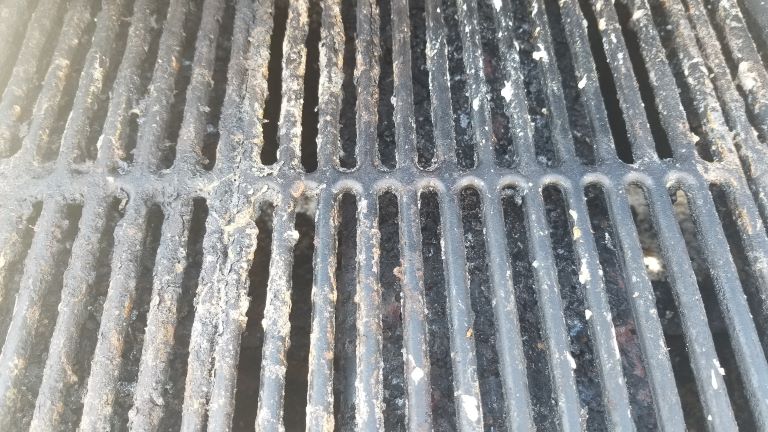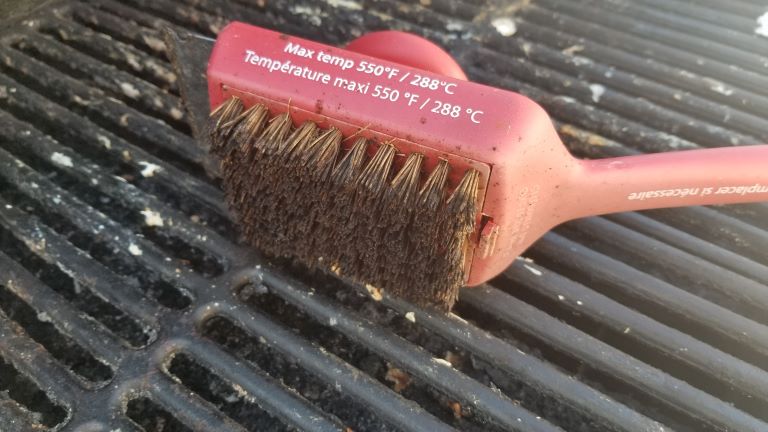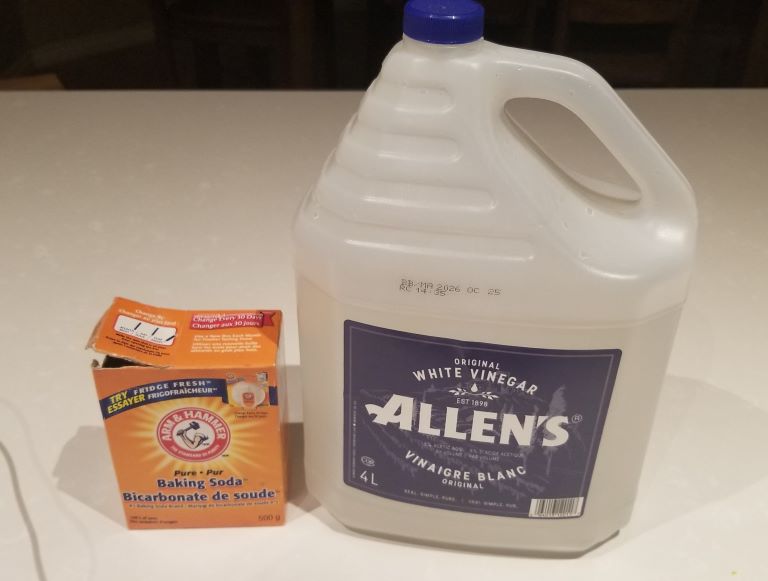Do you have dirty grill grates with stuck on food, sauce and who knows what else? Read along to learn how to clean cast iron grill grates along with some helpful tips to stop food from sticking in the first place.

Everyone loves a good cookout, but cleaning up your cast iron grill grates afterward can be a real pain in the you know what. After enjoying a big meal, you’d rather be relaxing with the rest of the family and having a good time with a drink in hand. The last thing you want to be doing is spending a bunch of time cleaning the grill.
However, spending a few minutes cleaning it after every use will save you time and hassle the next time you want to cook on it.
Plus, cleaning the grill right after using it while the grates are still warm is actually the easiest time to remove burnt on food.
Not only will it help in ensuring that your grill lasts a long time, but it will also keep food from burning and sticking to the grill while you are cooking. To top it all off, a well seasoned, clean grill grate will enhance the flavors of all foods cooked on it.
How to Clean Cast Iron Grill Grates
Cast iron grill grates should be cleaned after every barbecue. Doing this will ensure that you’re ready for the next cook off. It will also keep your grates clean and rust free so you never have to restore them which can be time consuming and dirty.
So, let’s take a quick look at how to clean your cast iron grill grates after every use.
The best way to clean your grill grates after cooking is to turn up the heat to high for a minute or two which will burn off a lot of the stuck on foods and barbecue sauce.
Once most of the food has burnt off or crisped, scrape the grill grates with a barbecue brush to remove any of the hard to remove and burnt-on substances.
If you take some general good care of your grill, then this should pretty much do it for cleaning it. Of course, there are those instances where you’ve cooked up something extra messy and the grill needs a little more care and elbow grease.
Be Careful when Choosing a Grill Brush
You can use a regular wire grill brush for cleaning, but be aware of the condition of the brush. As grilling brushes age, the bristles are susceptible to falling out and can dangerously end up in your food. There are many horror stories of people choking on wire bristles or worse, having them stuck internally.
It’s because of these horror stories that I switched to using a bamboo grilling brush a few years ago and I’m glad I did. There is never any danger of the wood bristles getting caught up in your food and the brush works really well at cleaning the grilling grates.

If all of the food is easily scraped off of the cast iron grates, then you can give them a light seasoning by applying a thin layer of oil to the grates with a paper towel. You can use any oil you like including vegetable oil, canola oil, or olive oil among others.
How to Remove Rust from a Cast Iron Grill Grate
Every once in a while you might forget to clean your cast iron grill grates after using it, which can sometimes lead to problems. If you use your grill often, then you most likely won’t have any issues. However, if your grill is stored away and not used for a long period of time, you might find that moisture got in and rust is starting to form.
While you don’t want to be cooking on a rust covered grate, this is nothing to worry too much about. The rust can be removed quite easily with a couple of products and a little elbow grease. There are a few different methods that you can use, which we will talk about next.
Soap, Water and Steel Wool
To start, use the scraper end of your grilling brush to scrape away as much loose rust as possible.
Next, you want to wash away the remaining rust using a combination of soap and water. Soak the grill grates in a tub full of warm, soapy water. Then, using steel wool, a stiff brush or an SOS pad, give the grates a thorough scrub to remove all of the surface rust.
Once all of the rust has been removed and the grill grates are back down to bare metal, you’ve done the job right.
To avoid having new rust formations on the grill grates, dry them completely before putting them away. Wipe them with a dry towel and leave them in the sun on a nice sunny day or put them back on the grill and turn it on for a few minutes to dry out any sitting moisture.
Once the grates are completely dry, it’s best to re-season them as soon as possible so that you don’t end up with the same issues once again.
The Vinegar Soak
For seriously rusted cast iron grill grates, a soapy water wash might not be enough to remove the rust spots. In this case, a vinegar soak might be needed first. Vinegar will dissolve the rust which is why it works for some of the toughest situations. However, once it has dissolved the rust, it will keep going and can damage the grates by eating away at the cast iron. When soaking with vinegar, check often so you can remove the grills once the rust has been dissolved.
To complete the vinegar soak, mix equal parts vinegar and water in a sink or bucket and submerge the grates fully. It could take anywhere from one hour to eight hours to remove the rust depending on the severity. An additional option is to mix some baking soda into the vinegar/water mixture which will activate and help to remove more of the rust as well.

Once the vinegar has done its job and all of the rust has been removed, give your grilling grates the same soapy water wash from above and dry them out thoroughly. This will ensure that you wash off all of the vinegar which can also be damaging if left on bare metal for too long.
Oven Cleaner
A grilling grate isn’t too different from the grates found in your oven at home and so cleaning them can be done in a similar way. Oven cleaners most often contain lye, which is an alkaline solution which is also used in making soap.
The oven cleaner that you’re using should have some instructions on how to use it printed on the spray can. For the most part, the steps will be as follows:
- In a well ventilated area, spray the grill grates with whatever oven cleaner you have on hand. Easy Off is a popular brand that works well.
- Place the grates in a box or garbage bag that can be sealed fairly well while the solution works on rust removal.
- Remove the grates once the rust all appears loose and easy to remove and clean. This can take anywhere from a half an hour to even a couple of days, depending on how rusted the grates are.
- Wash the grilling grates in a soapy water solution and dry completely.
- If there is still rust on the grates, redo as necessary.
Other topics you might enjoy: How to Change a Propane Tank
How to Season a Cast Iron Grill Grate
It’s a good practice to season your grill lightly after every use. This will help to avoid issues like rusting and will also build up a non-stick surface on the grates. This itself makes cooking easier and helps to avoid burning foods that stick to the grates.
If you’re seasoning your cast iron grill grates after cooking and a regular cleaning, then a light layer of oil spread over the surface of the grates is all you’ll need. Using a paper towel soaked in oil, rub the entire grilling surface to coat it lightly. You can use any cooking oil you like, but some of the most popular are vegetable oil, canola oil and olive oil.
If you have completed one of the deep cleanings that we just discussed in order to remove rust or a heavy build up of food and grime, then you will need to repeat the seasoning process a couple of times in order to make sure that the pores of the grill are thoroughly covered with oil.
Preventing Food from Sticking to the Grill
Seasoning your grill is probably the most important factor when it comes to preventing food from sticking to your cast iron grill.
However, one other big factor that is sometimes overlooked is preheating the grill adequately. Cast iron takes longer to heat up than stainless steel does. You’ll want to make sure that the grill grates are good and warm before putting meat on it as meat will absolutely stick to a cast iron grill that hasn’t been preheated enough.
While cast iron takes longer to heat up initially, it does retain the heat much better and will stay warm for a long time, even after turning the grill off.
We love writing about the things that make a real difference in your outdoor experience. Some of the links in this post are affiliate links in which case we may earn a small commission at no extra cost to you if you make a purchase. We truly appreciate you taking the time to read our content and hope it has added value to your next camping and outdoor adventure.




